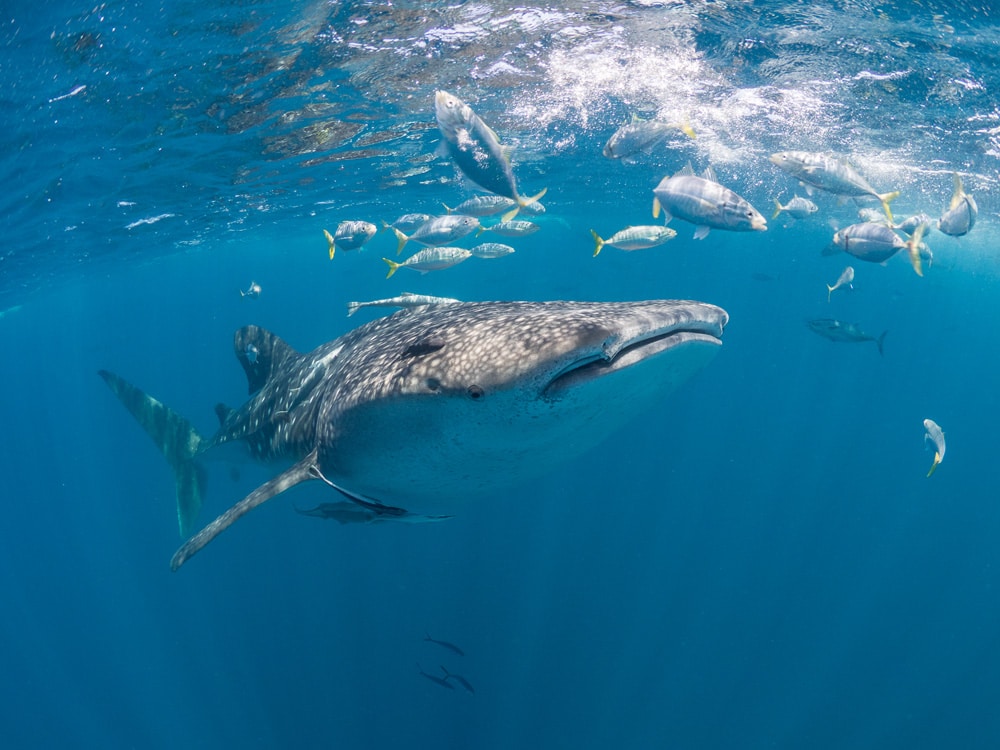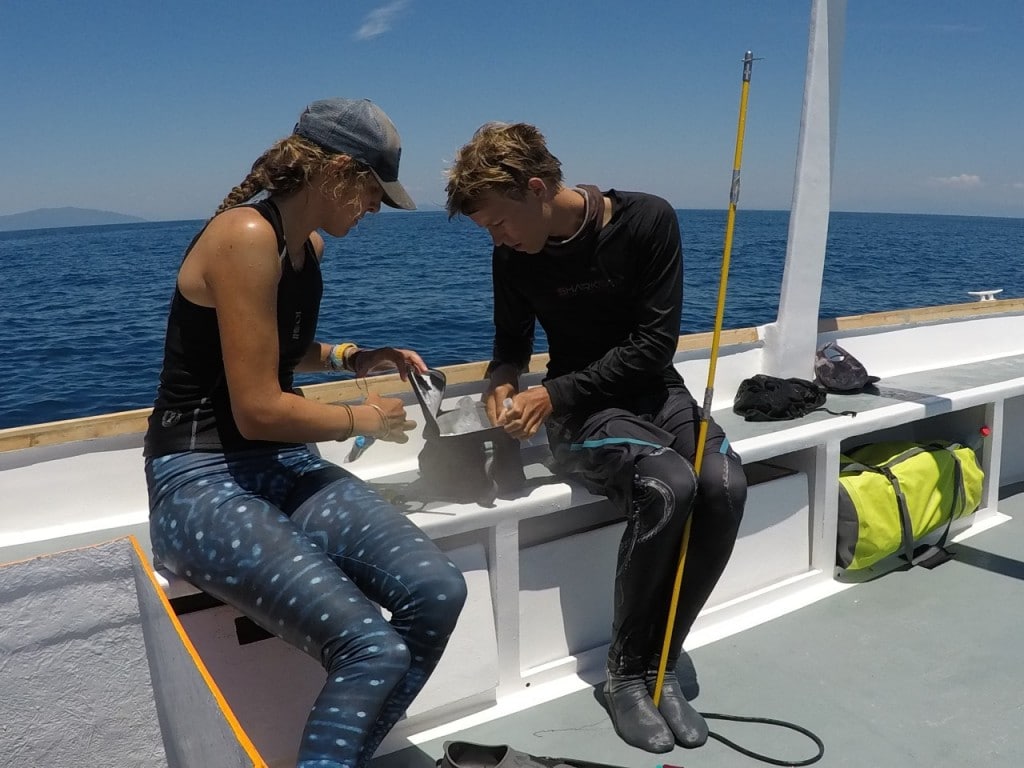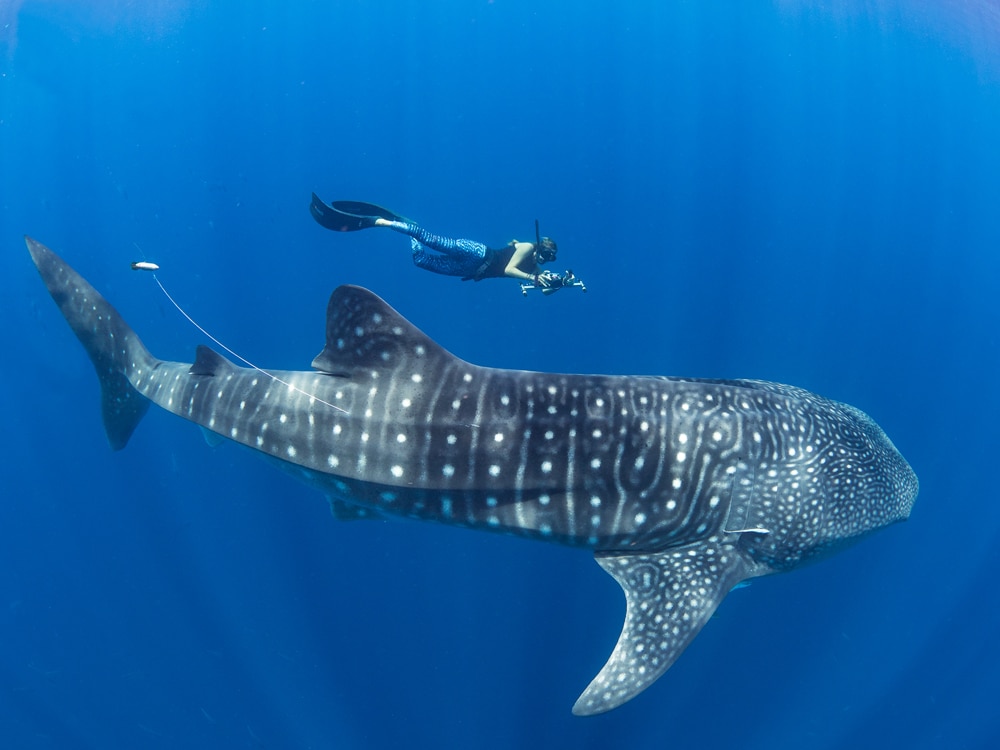Marine Life & Conservation
Madagascar emerges as hotspot for endangered whale sharks

A new study published in the journal Endangered Species Research has revealed that juvenile whale sharks swim to Madagascar, a newly-identified hotspot for these huge fish, to feed. Eighty-five individual sharks were identified in a single season using photographs of their distinctive spot patterns. An isolated ‘island continent’, famed for animals and plants that exist nowhere else in the world, Madagascar’s nutrient-rich waters are also home to an incredible array of marine life attracting increasing numbers of tourists.
Whale sharks are primarily seen around the small island of Nosy Be, in northwest Madagascar. This area is a globally important hotspot for large marine species, including manta rays, sea turtles, humpback whales and even rare Omura’s whales. The study is part of the Madagascar Whale Shark Project, a collaboration initiated in 2016 by researchers from the Marine Megafauna Foundation, Florida International University, and Mada Megafauna.
Lead author and project leader Stella Diamant said: “We’ve found that whale sharks regularly visit Nosy Be between September and December. That has led to a growing ecotourism industry, as people travel to see and swim with these gigantic, harmless sharks. We’re still learning about their population structure and movement patterns, but it’s clear the area is an important hotspot for the species.”
Whale sharks are the largest fish in the world, growing up to 20 meters long. However, all of the sharks seen in Madagascar have been juveniles of less than nine meters.
“We identified 85 individual whale sharks over our first season in 2016. Some of the sharks were present across several months. They spend a lot of time in the area and seem to come here to feed,” Diamant said.
The marine biologists uploaded photographs of the sharks’ unique spot patterns to Wildbook for Whale Sharks (a global database of sightings) and compared them with data collected from known feeding areas in the Indian Ocean, including Djibouti, the Maldives, Mozambique, Seychelles and Tanzania, but found no overlap.
“Whale sharks are a globally endangered species due to overfishing, accidental catches and boat strikes. Major declines in sightings have been seen in Mozambique, where we’ve documented a 79% decline in sightings since 2005, and the Seychelles. I was hoping that some of those sharks might have shifted over to Madagascar”, said co-author Dr Simon Pierce, co-founder and principal scientist at the Marine Megafauna Foundation.
“Unfortunately, that doesn’t seem to be the case. It’s great news for Madagascar though. These sharks can be a major asset for the country. There’s already a good marine ecotourism industry developing”, he added.
As part of this study, the team attached eight satellite tags to immature whale sharks to track their movements in near real-time. They found that the sharks spent most of their time in shallow waters between 27.5-30°C around the tagging area in Nosy Be.
Half of the tagged sharks also visited a second hotspot near Pointe d’Analalava, 180 km south of Nosy Be. Five of the sharks swam over to Mayotte and the Comoros islands, and two swam right down to the southern end of Madagascar. One of those sharks then swam back to Nosy Be, a total track of 4,275 km. The sharks are slow-swimmers, travelling an average 21 km per day. Three sharks were resighted in the Nosy Be area the following season after having lost their tags.
“It was exciting to see that there is a second hotspot for the sharks in the area. We will be exploring the area later this year. Madagascar clearly provides an important seasonal habitat for these young whale sharks, so we need to ensure they are effectively protected in the country”, concluded Diamant.
Madagascar is a known location for shark fishing and finning. Whale sharks are currently afforded no formal protection except in two Marine Protected Areas located to the southwest and northeast of Nosy Be.
“Over the last decade, shark populations have declined dramatically in Madagascar due to overfishing. However, the most significant threat to this species is the incidental catch in coastal gillnets and industrial purse seiners operating offshore”, said Dr Jeremy J Kiszka, a marine biologist at Florida International University and co-scientific lead of the Madagascar Whale Shark Project.
Whale sharks are listed as ‘endangered’ on the IUCN Red List of Threatened Species since 2016 and received an Appendix I listing the UN Convention on Migratory Species in 2017. As a signatory to the Convention, Madagascar is obligated to protect the sharks and their migratory habitat in national waters.
The study was supported by Les Baleines Rand’eau, Aqua-Firma, PADI Foundation, IDEA WILD, Waterlust, the Shark Foundation, and two private trusts.
Stella Diamant, Christoph A Rohner, Jeremy J Kiszka, et al. ‘Movements and habitat use of satellite-tagged whale sharks off western Madagascar’ was published on 17 May 2018 and is available here.
For more information about Marine Megafauna Foundation please visit:
Website: www.marinemegafauna.org
Facebook: www.facebook.com/MarineMegafauna
Images by www.simonjpierce.com
Marine Life & Conservation
Double Bubble for Basking Sharks

 The Shark Trust is excited to announce that, for two more days only, all donations, large or small, will be doubled in the Big Give Green Match Fund!
The Shark Trust is excited to announce that, for two more days only, all donations, large or small, will be doubled in the Big Give Green Match Fund!
Donate to Basking in Nature: Sighting Giants
The Shark Trust is hoping to raise £10k which will be doubled to £20k. This will go towards Basking in Nature: Sighting Giants. And they need YOUR help to reach they’re goal.
The Shark Trust’s citizen science project is to monitor and assess basking sharks through sightings; encouraging data collection, community engagement, and promoting nature accessibility. This initiative aims to enhance health and wellbeing by fostering a deeper connection with British Sharks.
Campaign Aims
- Increase citizen science reporting of Basking Sharks and other shark sightings to help inform shark and ray conservation.
- Provide educational talks about the diverse range of sharks and rays in British waters and accessible identification guides!
- Create engaging and fun information panels on how to ID the amazing sharks and rays we have on our doorstep! These can be used on coastal paths around the Southwest. With activities and information on how you can make a difference for sharks and rays!
- Promote mental wellbeing through increasing time in nature and discovering the wonders beneath the waves!
Donate, and double your impact. Click Here
Marine Life & Conservation
Leading UK-based shark conservation charity, the Shark Trust, is delighted to announce tour operator Diverse Travel as a Corporate Patron

 Corporate Patrons provide a valuable boost to the work of The Shark Trust. The Trust team works globally to safeguard the future of sharks, and their close cousins, the skates and rays, engaging with a global network of scientists, policymakers, conservation professionals, businesses and supporters to further shark conservation.
Corporate Patrons provide a valuable boost to the work of The Shark Trust. The Trust team works globally to safeguard the future of sharks, and their close cousins, the skates and rays, engaging with a global network of scientists, policymakers, conservation professionals, businesses and supporters to further shark conservation.
Specialist tour operator Diverse Travel has operated since 2014 and is committed to offering its guests high quality, sustainable scuba diving holidays worldwide. Working together with the Shark Trust will enable both organisations to widen engagement and encourage divers and snorkellers to actively get involved in shark conservation.
“Sharks are truly at the heart of every diver and at Diverse Travel, we absolutely share that passion. There is nothing like seeing a shark in the wild – it’s a moment that stays with you forever!” says Holly Bredin, Sales & Marketing Manager, Diverse Travel.
“We’re delighted to celebrate our 10th year of business by becoming a Corporate Patron of the Shark Trust. This is an exciting partnership for Diverse and our guests. We will be donating on behalf of every person who books a holiday with us to contribute towards their vital shark conservation initiatives around the world. We will also be working together with the Trust to inspire divers, snorkellers and other travellers to take an active role – at home and abroad – in citizen science projects and other activities.”
Paul Cox, CEO of The Shark Trust, said:
“It’s an exciting partnership and we’re thrilled to be working with Diverse Travel to enable more divers and travellers to get involved with sharks and shark conservation. Sharks face considerable conservation challenges but, through collaboration and collective action, we can secure a brighter future for sharks and their ocean home. This new partnership takes us one more valuable step towards that goal.”
For more information about the Shark Trust visit their website here.
For more about Diverse Travel click here.
-

 News3 months ago
News3 months agoHone your underwater photography skills with Alphamarine Photography at Red Sea Diving Safari in March
-

 News3 months ago
News3 months agoCapturing Critters in Lembeh Underwater Photography Workshop 2024: Event Roundup
-

 Marine Life & Conservation Blogs2 months ago
Marine Life & Conservation Blogs2 months agoCreature Feature: Swell Sharks
-

 Blogs2 months ago
Blogs2 months agoMurex Resorts: Passport to Paradise!
-

 Blogs2 months ago
Blogs2 months agoDiver Discovering Whale Skeletons Beneath Ice Judged World’s Best Underwater Photograph
-

 Gear Reviews3 months ago
Gear Reviews3 months agoGear Review: Oceanic+ Dive Housing for iPhone
-

 Marine Life & Conservation2 months ago
Marine Life & Conservation2 months agoSave the Manatee Club launches brand new webcams at Silver Springs State Park, Florida
-

 News3 months ago
News3 months agoWorld’s Best Underwater Photographers Unveil Breathtaking Images at World Shootout 2023









